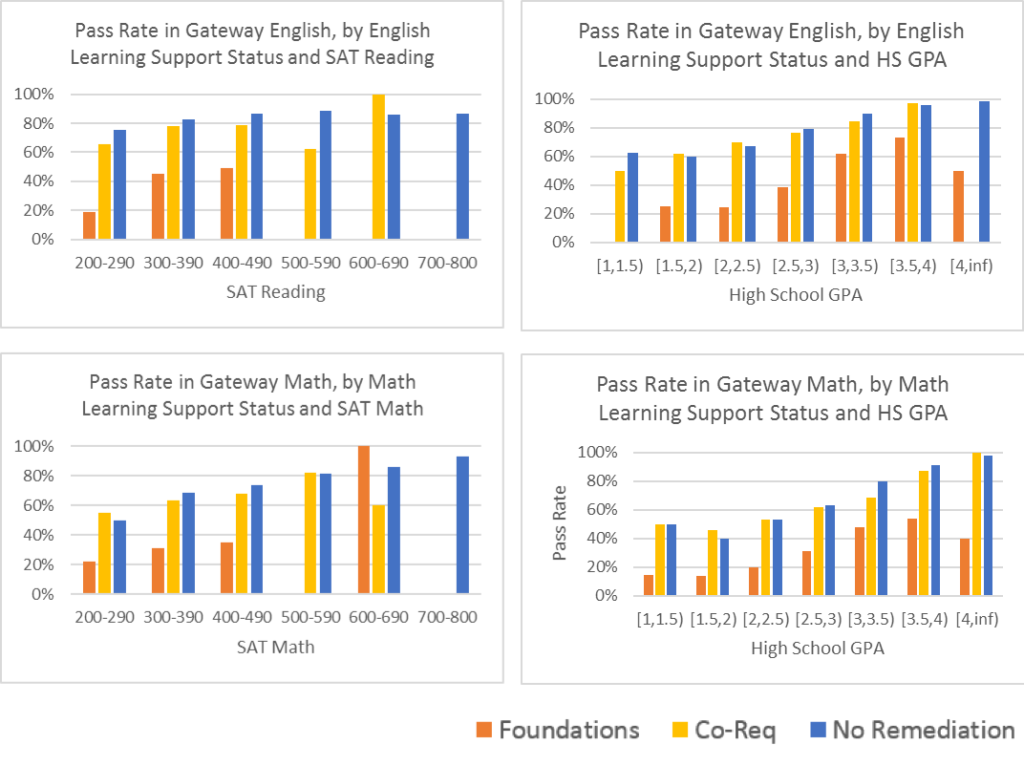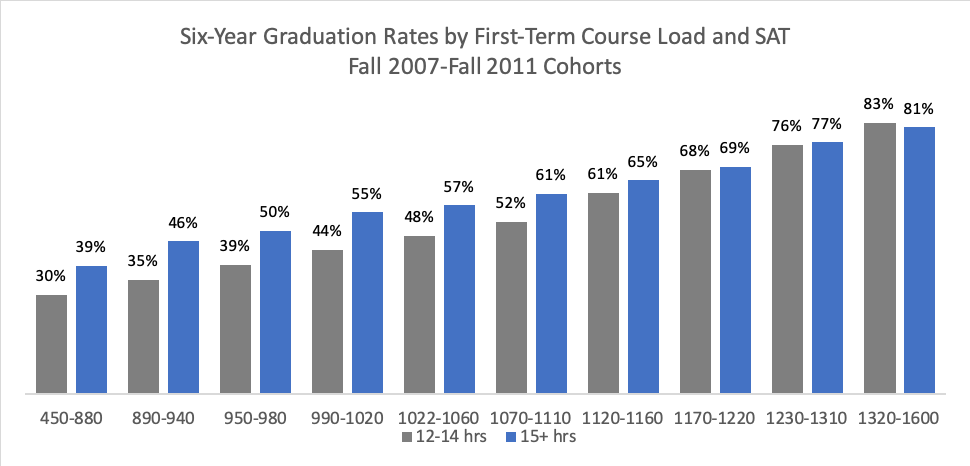The University System of Georgia (USG), in an effort to raise statewide degree attainment to 60% by 2025, has launched an ambitious set of system-led student success projects. This work began in earnest in 2011 with the Complete College Georgia (CCG) initiative, in partnership with Complete College America, and has expanded over the last two years to include the Momentum Year, a collection of first-year efforts designed to improve student persistence through college to graduation:
- Making a purposeful program choice
- Creating a productive academic mindset
- Attempting the first 30 hours of a clear pathway
- Attempting 9 hours in the Academic Focus Area
- Completing initial English and math courses
Now we are shifting from the Momentum Year to the Momentum Approach, which seeks to incorporate these same principles throughout a student’s academic career. This work also includes the recent system-wide shift to co-requisite remediation, away from the traditional learning support model whereby remedial courses and college-level courses are taken sequentially.
Research and data support has been integral to the development and implementation of USG’s student success initiatives. Through standard reporting, research and analysis, and technical support, USG staff have provided the critical work necessary to inform and sustain system-wide student success efforts. This post highlights a few of these key efforts, demonstrating the vital role of SHEEO agency data offices, data collection and reporting infrastructure, as well as data analyst and business intelligence staff in accomplishing system- and statewide goals.
Reporting
Our readily available collection of standard reports has helped equip system leaders and staff to discuss the CCG and Momentum Approach efforts in meaningful ways. Leveraging our existing reporting infrastructure — a team of business intelligence analysts and researchers as well as our data warehouse built for standard reporting — we provide a variety of standard reports and ad hoc reports to support system meetings, presentations, conferences, workshops, and the like. We also produce a series of reports that include longitudinal, disaggregated data on a variety of postsecondary outcomes for each institution (retention, graduation, degrees conferred, credit hour accumulation, learning support completion, etc.). This work supports campus reporting and analysis related to CCG initiatives, especially for our smaller institutions that have limited institutional research capacity. We are currently developing interactive visualizations of the CCG data to better support system and institutional leaders.
Analysis
In-depth analysis and research have helped demonstrate to various stakeholders the benefits of co-requisite remediation as opposed to traditional learning support models (known as Foundations in the USG). This work shows that regardless of academic preparation, students who participated in co-requisite learning support were more likely to earn a passing grade in gateway English and math courses relative to Foundations courses (see Figure 1 below). In fact, gateway course pass rates for co-requisite learning-support students were most similar to those for students who did not have learning support requirements.
Likewise, our analytic work has highlighted the advantages of taking a fuller course load in the first year. Through a propensity score matching analysis — a replication of a study from the Community College Research Center — we learned that USG students who attempt at least 30 hours in the first year are 13 percentage points more likely to graduate within six years than if they attempt fewer than 30 credits. Moreover, this analysis demonstrated that regardless of academic preparation, taking a fuller course load was beneficial to all students (see Figure 2 below). In fact, the marginal benefit of a fuller course load was most pronounced among the least academically prepared.


Technical Support
Technical support provided by system office researchers, business intelligence analysts, data warehouse architects, and learning management system (LMS) experts has enabled the implementation of co-requisite remediation by automating learning support placement and building the course registration processes. The shift to co-requisite remediation system-wide was accompanied by a paradigm shift in the placement of learning support students and necessitated a new approach to course registration to ensure simultaneous enrollment in remedial and gateway courses. We also had to consider how to capture this new information in the Academic Data Collection (ADC) in ways that would support reporting and analysis of these initiatives. To accomplish this, we considered what senior leaders would ultimately want to know about the new learning support model and how we could conduct rigorous analyses to determine its effectiveness. Bringing these questions into the data entry and collection phases has helped prepare us for future reporting and analytic work.
We took the same approach when adding in data elements related to students’ academic focus area, one of the Momentum Approach elements. Adding in the focus area to student registration data allows academic advisors to guide course selections better. We will soon begin collecting this new data element at the system level, further enhancing our reporting and analysis on system-wide student success initiatives.
Lastly, we have provided technical support in the form of secure storage of sensitive information linking student surveys to administrative data. Since Fall 2017, the USG has partnered with Motivate Lab at the University of Virginia to develop and administer a system-wide mindset survey to incoming first-year students. The purpose of the survey is to better understand students’ motivations in attending college, mindsets around math and English (in other words, what students believe about their learning capabilities), as well as an inventory of scarcity-related items (food insecurity, housing, ability to pay for college, etc.). System office research staff have supported this work by securely storing the survey data as well as linking survey responses to administrative data, allowing USG and Motivate Lab analysts to determine how mindset, motivation, and scarcity relate to a variety of postsecondary outcomes. Read more about this work here.
Reporting, analysis, technical expertise, and the intricate ways in which these efforts work together, are critical for the development and implementation of large-scale efforts such as the USG’s Momentum Approach.
